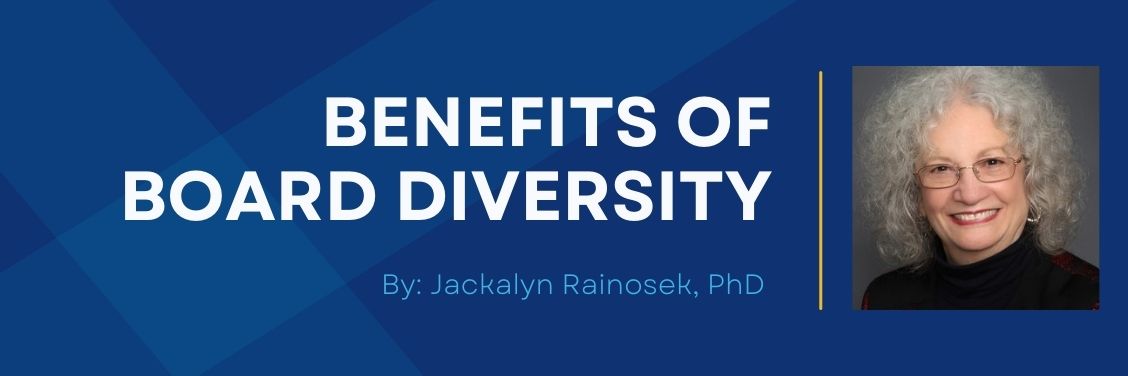
Questions to Ask the Board
- What do you believe are the benefits of a diverse board membership?
- What have you read that gives information about the value of having diversity in a board?
- What are all the types of diversity that could benefit a board?
Gender Diversity
Dysfunction in the Boardroom, an article in the Harvard Business Review, identifies three major approaches that boards take in addressing gender diversity:
- “Institute fairness and rebuke discrimination.” Government intervention, whether voluntary (disclosure reporting as recommended by the SEC) or mandatory (quotas), has made boards more responsive to the fairness argument for diversity
- “Build a deeper understanding of and access to desirable customer bases and markets, such as female customers.”
- “Incorporate a new perspective and generate learning. When this is the goal of a board, diversity is integrated into all its discussions and decisions, producing the greatest impact.
Using this article as the basis for a discussion about board diversity, a board chair could initiate a conversation with board members and ask the initial question in this article and have them answer the following questions:
- How would you benefit personally from a diverse board?
- How will board decisions benefit from having board diversity?
- How will your business benefit from being on a diverse board?
Asking board members to answer these questions ensures that they invest time and energy into the topic of diversity, equity, and inclusion (DEI), a process that helps them take the critical step of moving beyond where they are and committing to careful and thoughtful consideration of a DEI initiative.
Roosevelt Thomas—Strong Case for diversity
Roosevelt Thomas, Jr. was a “cultural diversity pioneer at the forefront of developing a framework for Diversity Management and innovative strategies for maximizing organizational and individual potential” and he knew he could reach business owners on the subject of diversity if he could show them the benefits of a diverse workforce in their organizations and in their boards. His book, Beyond Race and Gender: Unleashing the Power of Your Total Work Force by Managing Diversity, details his thoughts about the value and benefits of diversity. Thomas makes the case that boards function based on the perspectives of their members, and boards with limited perspectives are limited in their function and diminished in their decision-making abilities. He also points out that people will remain on boards, and perform at their highest levels while there, when they feel appreciated, valued, and included. These are strong arguments for DEI initiatives and establishing board diversity.
My own experiences as a DEI consultant, supported by what I have learned from Roosevelt Thomas through his books and programs, leads me to identify the following key points regarding board diversity:
- When the organization’s board members are more representative of the diverse workforce and the customer base of the organization, then their strategic focus and support lead to significant gains for the organization and they are able to provide invaluable support to the CEO.
- Board members who come from diverse backgrounds and have unique experiences from their identity groups contribute to a more innovative and exciting board process. They also bring their technical skills, professional knowledge, and experience from their field with a diverse point of view.
- Today, some professionals will not serve on boards that do not have a DEI focus and do not have DEI included in the board’s vision, mission, and values.
- Diverse boards are much more creative and develop significant options to consider in solving issues related to the charge of the CEO or interactions happening in the organization that can impact performance. Living in Houston, Texas, I am aware of the impact of shareholder initiatives that have the power to change board membership, and many of them will require a DEI focus. This happened at ExxonMobil when a small hedge fund successfully elected activist climate-focused directors to the board. This is a response to growing investor concerns that the company is ignoring the global warming impact on the company’s future. These actions have also led to a greater focus on DEI at ExxonMobil and there is a momentous change in the culture and work environment.
Other benefits that Thomas identifies include the fact that diverse boards are more capable of advising CEOs of global companies since the board is more likely to be knowledgeable about the places where the company conducts its business. Diverse boards are better positioned to attract the most highly skilled members across a larger selection of identity groups. A diverse board is also self-reinforcing since greater diversity means greater inclusion and diversity capabilities. Board diversity initiatives also enable boards to “balance social, moral, and economic concerns in a single effort.”
More questions for Board Members to consider:
- Have you read articles that show the benefits of having diversity, equity, and inclusion as a priority for board formation?
- Are board members willing to find resources identifying the benefits and the challenges of establishing board diversity?
- What other benefits do board members see after reading the article?
This is the first in a series of nine articles, discussing the board and management level considerations of a well-considered and implemented DEI initiative.

ABOUT JACKALYN RAINOSEK, PHD
Dr. Jackalyn Rainosek is CEO and Co-Founder of DTP Leadership Group, as well as founder and principal of DTP Business Strategies. She has worked extensively with a wide range of Leaders as they make strategic decisions in ever-changing circumstances to achieve extraordinary results and increase profitability. As a senior business consultant and marketing strategist Dr. Rainosek works with business owners and corporate executives to generate optimal results and exponential growth. Dr. Rainosek guides organizations to develop more appropriate leadership styles, enhance cultural competency (through diversity, equity, and inclusion initiatives), and improve levels of trust and cooperation both internally and with the customer base
